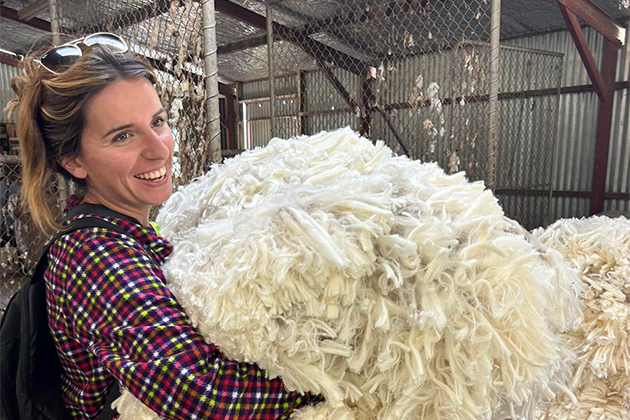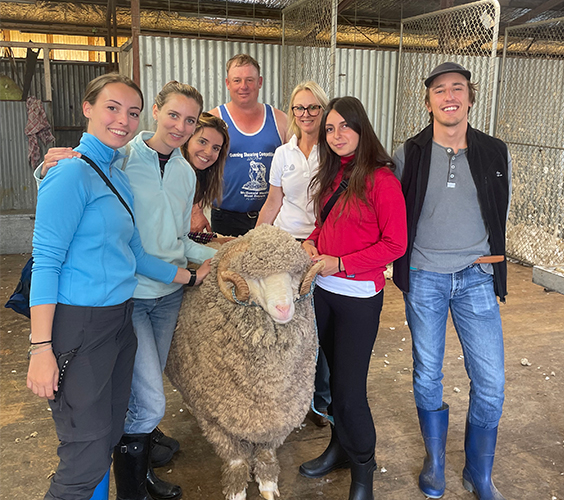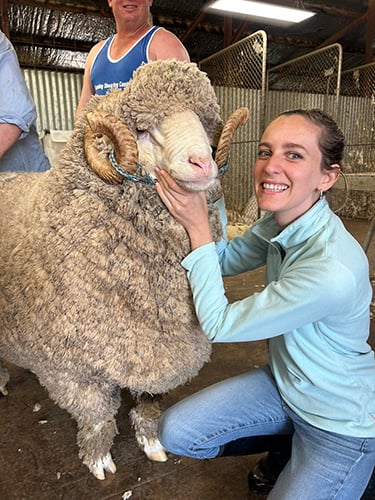Biella students learn about Aussie wool

Five Italian postgraduate students on a global study tour recently visited Australia to increase their knowledge of the Australian wool industry and how the fibre is produced.
AWI supported the visit in September by the five Italian students on the Biella Master Noble Fibre postgraduate course to help them learn more about the production and natural attributes of Merino wool in Australia.
During their year-long course, which is based in Biella, the students examine the entire textile supply chain, from the raw materials through to the final product. In addition to their studies in Italy, the students undertake an overseas tour, including to Australia.
The Woolmark Company has supported visits to Australia by Biella Master students since 1989 which demonstrates the long-standing relationship between the two organisations.
This year, the students began their trip by visiting the AWI office in Sydney where they learnt about AWI’s R&D, marketing, sustainability and education activities.
The students then visited the wool auctions at Yennora, before travelling to the Southern Tablelands of NSW to visit several wool-growing properties, Hillcreston Park Superfine Merino Stud at Bigga and Thalabah Merino Stud at Laggan, where the students were shown shearing, fleeces, stud sheep as well as lambing ewes.

The five Italian postgraduate students – Giulia Masciangelo, Ilaria Pennacchini, Jehona Lutfija, Asya Locche, Matteo De Giambattista – at Thalabah Merino Stud at Laggan with Thalabah’s Anthony Frost and AWI Industry Relations Officer for NSW Kristen Frost.
Rounding off their trip to Australia, the students visited AWH’s wool store at Goulburn and the family owned and operated Lindner Quality Socks at Crookwell where they were given a demonstration of manufacturing socks by owner Andrew Lindner.
The students said they found the tour very informative, and they came out of the experience with positive feedback.
“I feel grateful for having participated in this wool tour because, so far, during my training in Italy I have visited many mills processing Australian Merino wool. This tour allowed me to track the early steps of the Merino wool supply chain in Australia, from farms to wool auctions, to wool handling,” said student Ilaria Pennacchini, who is a graduate in Fashion Studies at La Sapienza University of Rome.
“It has been interesting to discover the complex network supporting Australian farmers in selling their wool. For this reason, I was very excited to see wool auctions in Yennora and to visit the wool handling facility at Goulburn.”
Ilaria said the students’ knowledge of and appreciation for Australian wool increased during the tour.
“Absolutely. During the tour, we had the opportunity to ask farmers questions about sheep welfare, wool quality, land management, and Merino visual classing. We found that there are many aspects to consider in sheep farming and that pastures and the weather play a significant role in producing high-quality wool. The passion of the people working in Hillcreston Park and Thalabah farms is what I appreciated the most on the tour.
“What I like about wool is that its production brings together different knowledge such as agriculture, animal farming, technical processing skills, and textile engineering. In terms of sustainability, the interconnection with so many areas of expertise makes the wool industry an excellent model for further improvements in the textile sector towards a fairer and more responsible production.”

Italian student Ilaria Pennacchini: “Wool is an extraordinary natural fibre, suitable for a wide range of products due to its many properties.”
This article appeared in the December 2023 edition of AWI’s Beyond the Bale magazine. Reproduction of the article is encouraged.












